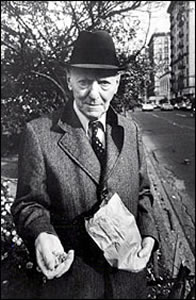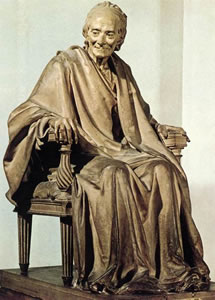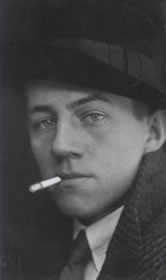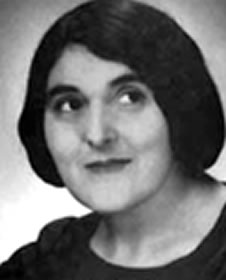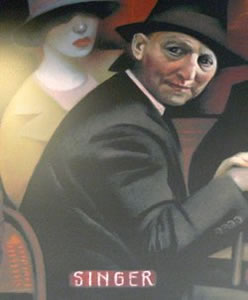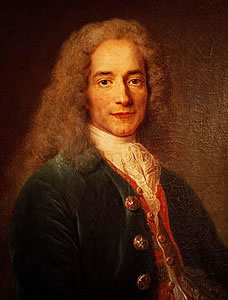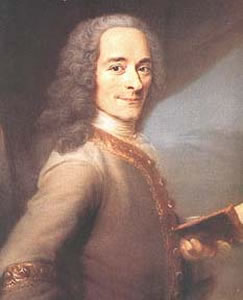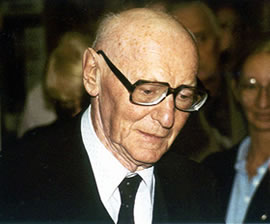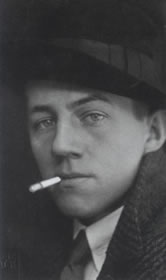De Amerikaans-Poolse schrijver Isaac Bashevis Singer werd geboren op 21 november 1904 als Isaac Hertz Singer in Radzymin, Polen. Zie ook mijn blog van 21 november 2006 en ook mijn blog van 21 november 2007 en ook mijn blog van 21 november 2008.
Uit: Shadows on the Hudson (Vertaald door Joseph Sherman)
„Stanislaw Luria, Ann’s husband, was trying to win over his host’s nephew Herman. While Herman remained a staunch Communist, Luria was bitterly opposed. His only grievance against America was its failure to drop the atomic bomb on Moscow instead of Hiroshima. Luria and Herman had one thing in common, however: they both spoke eloquent Polish. Luria had trained as a lawyer in Warsaw, and Herman had studied in the jurisprudence faculty before going off to defend Madrid.
Now Luria reasoned: “Prosze pana, I know exactly what you think. I know more Marxism than all the Marxists put together. To my regret, I too made a fool of myself for a while. There was a time I even believed in Lenin. Ah, in one’s youth one makes mistakes. When a young man doesn’t make mistakes, there’s something wrong with him. But one thing I hope you’ll grant me: that without Uncle Sam’s help, without lend-lease, your Comrade Stalin would never have marched into Berlin. This, I expect even the most ardent Stalinist will concede …”
Luria spoke as if he was begging Herman to see reason. Luria, past fifty, was short and broad-shouldered, and had an enormous head, no neck to speak of, a disheveled shock of brown hair streaked with gray, and a face that was either bloated or swollen by self-importance. His thick eyebrows overhung yellow eyes set in blue pouches flaked with crud. His nose had unusually large nostrils. There was something brutish and wild about him, yet he seemed sluggish, half-asleep. His narrow forehead was deeply cloven–whether with a wrinkle or a scar it was difficult to say.
Herman was barely thirty three, but he looked older. He was short like his uncle but not so homely. He had a square head with hair cropped short in military fashion–in Spain he had been promoted to the rank of either captain or major–and cold, steel-gray eyes behind a pince nez. Herman spoke slowly and with the deliberation of a diplomat watching every word.
His voice beat woodenly. “No one can know what would have happened without lend-lease. That is an academic question. One thing is beyond doubt: America delayed opening a second front until the Soviet Union was on the verge of decisive victory.”
“Are you suggesting that the invasion of France was superfluous?” Luria demanded.
“By that time the fascists had already been smashed.”
“If we let Stalin write world history, he would more than likely record that the Allies fought on Hitler’s side,” Luria retorded acidly.
“Until Stalingrad, the Allies always hoped for a Soviet defeat.”
Luria raised his eyebrows. His yellow eyes kindled with fury. His right hand–broad, heavy, with swollen veins and fingernails resembling claws twitched as though about to strike a blow. But it never left his knee. Instead, he countered ponderously: “Oh God, look at the might of falsehood! How incredibly vast and powerful it is! Like a bottomless pit.”
Boris was not a scholar, not a learned man, but he loved both Torah and knowledge. Although he had been successful in business, he regretted more than once that he had not become a rabbi, a scholar, or simply a hack writer. Short, stocky, with hands and feet too big for his small frame, large black eyes, a crooked nose, and thick lips, he wore a goatee and spoke in a booming voice. He
persisted in speaking Warsaw Yiddish, having never learned either German or English properly.“
Isaac Bashevis Singer (21 november 1904 – 24 juli 1991)
De Amerikaanse schrijfster en literatuurwetenschapster Marilyn French werd geboren op 21 november 1929 in New York. Zie ook mijn blog van 21 november 2007 en ook mijn blog van 21 november 2008. Marilyn French overleed op 2 mei van dit jaar op 79-jarige leeftijd.
Uit: De minnaar (Vertaald door Jeanette Bos)
“Henry nam een slok en minachting verdreef al zijn gedachten. Hij staarde naar Hawkes en wist dat het hem goed afging, dat zijn gezicht zijn gevoelens nooit verried, dat Hawkes dacht dat Henry geïmponeerd was en ingespannen luisterde om tussen de regels Hawkes’ geheim te zoeken. Henry voelde zich net een zalm die per ongeluk naar een zee vol haaien was gezwommen en alleen in leven was gebleven door zijn slimheid, door zich listig zozeer als de andere haaien te gedragen dat ze hem voor een van hen hielden. En hij had het overleefd. Maar toch, dacht hij terwijl hij Hawkes mond en wenkbrauwen zag bewegen maar geen woord hoorde, was er een probleem. Hij was een zalm, door de natuur voor iets beters bestemd, gezegend met het vermogen een heldhaftige prestatie te leveren en tegen de stroom op te tornen, de rivier op te zwemmen naar de bron om zijn eieren te leggen. Of deden alleen de vrouwtjes dat? Zwomme mannetjeszalmen ook stroomopwaarts? Hoe dan ook, hij had dat vermogen, dat iets in zich, maar kon er niets meer doen.”

Marilyn French (New York, 21 november 1929 – 2 mei 2009)
De Nederlandse schrijfster Margriet de Moor werd als Margaretha Maria Antonetta Neefjes op 21 november 1941 in Noordwijk geboren. Zie ook mijn blog van 21 november 2008.
Uit: Witte Liefde
‘Op officiële recepties van de gouverneur luister ik naar iemand. Dan merk ik ineens dat ik alleen nog maar het gelijkmatige roezemoezen in de ruimte hoor, de sprekersstem is veranderd in een klank, een motorboot, een wiekslag. Mijn voeten raken los van de grond, mijn hoofd zweeft enkele millimeters boven mijn nek en kantelt langzaam als een poppenhoofd naar alle kanten, wat niemand merkt. Het is een aangenaam gevoel, niets betekent meer iets, niets hoeft. Het is wegglijden in de beslotenheid van mijn eigen gedachten. Mij is wel eens gezegd dat ik op zo’n moment bijna devoot kijk, misschien moet je het bête noemen. Maar als ik zo ben, niks versta van wat ze zeggen, dan ben ik eigenlijk tevreden, dan weet ik dat er nog een wereld bestaat buiten die pratende monden, die patio, die receptie waar ik elegant hangend aan Rudi’s arm de mensen begroet en iedereen iedereens avondjurken met de exact bijpassende juwelen, tasjes en schoenen bewondert.’
(…)
“Hij staat op van het plankier, mijn kant zakt wat naar beneden, hij loopt een eindje weg, steekt zijn hand op en zwaait nog als hij van me af loopt. Bij de lichtblauwe Chrysler draait hij zich naar me om en lacht. Als hij wegrijdt, maakt de motor een lekker licht, ronkend geluid. Van de pomp, een meter of tien naast de ijskiosk, komt de geur van verse benzine gedreven, ik hoor het belletje en het zoemen van de meter.’
Margriet de Moor (Noordwijk, 21 november 1941)
De Oostenrijkse schrijfster en vertaalster Veza Canetti werd als Venetiana Taubner-Calderon geboren op 21 november 1897 in Wenen. Zie ook mijn blog van 21 november 2008.
Uit: Die Schildkröten
“Diese vielen Braunhemden in der Allee! Er steigt in den Garten wie ein Mensch, der nicht mehr hier wohnt. Der hier fremd ist und kein Recht hat. Zum ersten Mal war er unsicher in diesem Haus, obwohl doch eben die Frau, der es gehört, sich freundlich gezeigt hat, fast mit einer Miene, als beschütze sie ihn. Sie ist sonst klar im Kopf und gar nicht weich. Südtirol hat er ihr versprochen, sie tat ihm leid. Mein Gott, wie klein sind ihre Schmerzen, und seine haben in dem Garten nicht Platz. Man muß weglaufen, wenn auch mitten hinein in die braune Rotte. Denn, wenn man nicht läuft, bricht man zusammen. Nur nicht die Haltung verlieren. Schwer, sie zu bewahren, wenn man den Berg hinunterrast, mit großen Schritten ins Dorf hineinläuft.
(…)
Die Schildkröte lebt in einem harten Panzer, aber er wird ihr geraubt, weil er so schön ist, er schützt sie nicht und sie bleibt nackt.
Ihr Geheimnis ist Gleichmut. Sie lebt von nichts, von Luft, von Blättern, sie läßt sich zerschneiden, zerstückeln, zerreißen, und sie lebt weiter, stumm und schwer. Aber sie braucht Wärme.
Ohne Wärme muß sie sterben.
Erspäht sie der Geier, muß sie sterben. Er trägt sie hoch in die Luft, in seinen grausamen Krallen, und läßt sie am Felsen zerschmettern. Jetzt ist ihr Fleisch sein Fleisch, jetzt verzehrt er ihr Fleisch.
Erspäht sie der Tiger, muß sie sterben. Er legt sie um und nun ist sie verloren. Er zerfetzt sie und verzehrt ihr Fleisch. Er rast um sich und in wilder Kraft legt er alle um, alle, die er findet. Er läßt sie auf dem Rücken liegen und die Schildkröte auf dem Rücken muß verhungern. Es sei denn, es erspäht sie der Mensch. Er bewundert ihren Panzer, er glänzt so schön. Der Mensch bringt das Tier zum Glühen, damit der Panzer sich löst und sein Wunsch sich erfüllt. Ist es denn ein großer Wunsch? Der Mensch ist behutsam, er sieht bald, daß das Feuer den Glanz vermindert. Er wirft das Tier doch lieber in siedendes Wasser, damit der Panzer keinen Schaden nimmt. Das Gehäuse ist gerettet und das Tier kriecht todwund davon.“
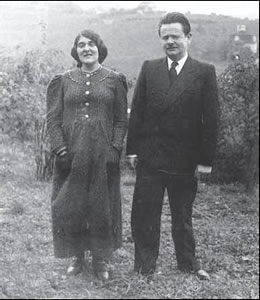
Veza Canetti (*21 november 1897 – mei 1963)
Met haar echtgenoot Elias Canetti
De Britse schrijfster Freya North werd geboren op 21 november 1967 in Londen. Zie ook mijn blog van 21 november 2008.
Uit: Pillow Talk
“By day, Petra Flint is a talented jeweller working in a lively London studio. By night, she sleepwalks. She has 40 carats of the world’s rarest gemstone under her mattress but it’s the skeletons in her closet that make it difficult for her to rest. The insomniac. At one time a promising song-writer, Arlo Savidge now teaches music at a boys’ boarding school in North Yorkshire. He assumes he’s happy with his isolated lifestyle. But, like Petra, ghosts from his past disturb his sleep. Putting the past to bed. Petra and Arlo loved each other from afar during their schooldays. Now, seventeen years later, in a tiny sweetshop one rainy day, they stand before each other once more. Could this be their second chance?”
Freya North (Londen, 21 november 1967)
De Engelse schrijver en crticus Sir Arthur Thomas Quiller-Couch werd geboren op 21 november 1863 in Bodmin, Cornwall. Zie ook mijn blog van 21 november 2008.
Uit: Dead man’s Rock
“Whatever claims this story may have upon the notice of the world, they will rest on no niceties of style or aptness of illustration. It is a plain tale, plainly told: nor, as I conceive, does its native horror need any ingenious embellishment. There are many books that I, though a man of no great erudition, can remember, which gain much of interest from the pertinent and appropriate comments with which the writer has seen fit to illustrate any striking situation.
From such books an observing man may often draw the exactest rules for the regulation of li
fe and conduct, and their authors may therefore be esteemed public benefactors. Among these I, Jasper Trenoweth, can claim no place; yet I venture to think my history will not altogether lack interest–and this for two reasons. It deals with the last chapter (I pray Heaven it be the last) in the adventures of a very remarkable gem–none other, in fact, than the Great Ruby of Ceylon; and it lifts, at least in part, the veil which for some years has hidden a certain mystery of the sea. For the moral, it must be sought by the reader himself in the following pages.
To make all clear, I must go back half a century, and begin with the strange and unaccountable Will made in the year of Grace 1837 by my grandfather, Amos Trenoweth, of Lantrig in the County of Cornwall. The old farm-house of Lantrig, heritage and home of the Trenoweths as far as tradition can reach, and Heaven knows how much longer, stands some few miles N.W. of the Lizard, facing the Atlantic gales from behind a scanty veil of tamarisks, on Pedn-glas, the northern point of a small sandy cove, much haunted of old by smugglers, but now left to the peaceful boats of the Polkimbra fishermen.
In my grandfather’s time however, if tales be true, Ready-Money Cove saw many a midnight cargo run, and many a prize of cognac and lace found its way to the cellars and store-room of Lantrig. Nay, there is a story (but for its truth I will not vouch) of a struggle between my grandfather’s lugger, the Pride of Heart, and a certain Revenue cutter, and of an unowned shot that found a Preventive Officer’s heart. But the whole tale remains to this day full of mystery, nor would I mention it save that it may be held to throw some light on my grandfather’s sudden disappearance no long time after. Whither he went, none clearly knew. Folks said, to fight the French; but when he returned suddenly some twenty years later, he said little about sea-fights, or indeed on any other subject; nor did many care to question him, for he came back a stern, taciturn man, apparently with no great wealth, but also without seeming to want for much, and at any rate indisposed to take the world into his confidence.”
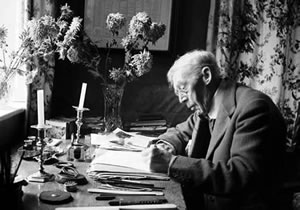
Arthur Quiller-Couch (21 november 1863 – 12 mei 1944)
De Duitse dichter en schrijver Wilhelm Friedrich Waiblinger werd geboren op 21 november 1804 in Heilbron. Zie ook mijn blog van 21 november 2008.
Kunsturtheil
Kommen Sie doch, welch Gepinsel ist das, das ist ja erbärmlich,
Welch eine Farbe! – “Mein Herr, das ist ein Tizian doch!” –
Richtig – ein Tizian – es ist wahr – ich erkenn’ es, ja freilich –
Ja ’s ist ein Tizian – ist ein vortreffliches Bild.
Späte Einsicht
Die Lieb’ ist wie die Sonne,
Verwegner Uebermuth,
Der schaudernd in der Wonne
Der heißen Lebensgluth,
Den Lichtquell zu ergründen,
In seine Tiefe blickt,
Muß da zuletzt erblinden
Wo sich sein Herz entzückt.
Doch wer nur still bescheiden
Das sanfte Licht genießt,
Woraus ein Meer von Freuden
Für alle Wesen fließt,
Wer nie die letzte Quelle,
Nur ihre Wirkung sucht,
Den labt die Sonnenhelle,
Der keine Thräne flucht.
So denk’ ich oft und meine,
Daß ich wohl gut gedacht.
Doch wenn ich trostlos weine
Hinaus in all’ die Nacht,
Wenn sich mein Auge wendet
Zu Morgensternes Glanz,
Da fühl’ ich’s nicht geblendet,
Wohl aber blind es ganz
Wilhelm Waiblinger (21 november 1804 – 17 januari 1830)
De Franse schrijver Voltaire, (pseudoniem van François-Marie Arouet) werd werd op 21 november 1694 geboren in Parijs. Zie ook mijn blog van 21 november 2006 en ook mijn blog van 21 november 2007 en ook mijn blog van 21 november 2008.
Uit: L’Ingenu
“Un jour, saint Dunstan, Irlandais de nation et saint de profession, partit d’Irlande sur une petite montagne qui vogua vers les côtes de France, et arriva, par cette voiture, à la baie de Saint-Malo. Quand il fut à bord, il donna la bénédiction à sa montagne, qui lui fit de profondes révérences, et s’en retourna en Irlande par le même chemin qu’elle était venue.
Dunstan fonda un petit prieuré dans ces quartiers-la, et lui donna le nom de prieuré de la Montagne, qu’il porte encore, comme un chacun sait.
En l’année 1689, le 15 juillet au soir, l’abbé de Kerkabon, prieur de Notre-Dame de la Montagne, se promenait sur le bord de la mer avec Mlle de Kerkabon, sa soeur, pour prendre le frais. Le prieur, déjà un peu sur l’âge, était un très bon ecclésiastique, aimé de ses voisins, après l’avoir été autrefois de ses voisines. Ce qui lui avait donné surtout une grande considération, c’est qu’il était le seul bénéficier du pays qu’on ne fût pas obligé de porter dans son lit quand il avait soupé avec ses confrères. Il savait assez honnêtement de théologie; et, quand il était las de lire saint Augustin, il s’amusait avec Rabelais: aussi tout le monde disait du bien de lui.
Mlle de Kerkabon, qui n’avait jamais été mariée, quoiqu’elle eût grande envie de l’être, conservait de la fraîcheur à l’âge de quarante-cinq ans. Son caractère était bon et sensible: elle aimait le plaisir, et était dévote.
Le prieur disait à sa soeur, en regardant la mer: « Hélas! c’est ici que s’embarqua notre pauvre frère avec notre chère belle-soeur Mme de Kerkabon, sa femme, sur la frégate l’Hirondelle, en 1669, pour aller servir en Canada. S’il n’avait pas été tué, nous pourrions espérer de le revoir encore.
— Croyez-vous, disait Mlle de Kerkabon, que notre belle-soeur ai
t été mangée par les Iroquois, comme on nous l’a dit? — Il est certain que, si elle n’avait pas été mangée, elle serait revenue au pays… Je la pleurerai toute ma vie… C’était une femme charmante; et notre frère, qui avait beaucoup d’esprit, aurait fait assurément une grande fortune. »
Voltaire (21 november 1694 – 30 mei 1778)
Beeld van Jean-Fracois Houdon, 1773
De Duitse schrijver en vertaler Franz Hessel werd geboren op 21 november 1880 in Stettin. Zie ook mijn blog van 21 november 2006. en ook mijn blog van 21 november 2008.
Uit: Spazieren in Berlin (1929)
„Lerne Gegenwart, sei nicht immer unterwegs. Es sieht ja reizend aus, wenn du beschwingten Schrittes an den noch Langsamen vorübergleitest und sicher durch die Menge zum Schaufenster steuerst, genau an der Stelle, an der du etwas Bestimmtes zu konstatieren hast. Aber mir geht der Atem aus, wenn ich deinen Knöcheln nachsehe, meine unverwandelbare Verehrung für dich bekommt
etwas Asthmatisches. Verweile doch … Nicht so faustisch, Fräulein! Bitte flaniere!
Das ist ein Fremdwort und wird ein fremder Begriff bleiben, bis du dich so bewegst, daß ein neues Wort von deinem schönen Gange redet. Lustwandeln ist zu kleinstädtisch. Berlinerin, schaff’ ein neues Wort. Mach’ einen Korso aus deinem westlichen Boulevard Tauentzienstraße- Kurfürstendamm.“
(…)
„Verfolge im Vorübergehn die Lebensgeschichte der Läden und der Gasthäuser. […] Wieviel Schicksal, Gelingen und Versagen kannst du aus Warenauslagen und ausgehängten Speisekarten ablesen, ohne daß du durch Türen trittst und Besitzer und Angestellte siehst. Da ist wieder das große Vorrecht des Spaziergängers. Er braucht nicht einzutreten, er braucht sich nicht einzulassen. Er liest die Straße wie ein Buch, er blättert in Schicksalen, wenn er an Hauswänden entlang schaut.“
Franz Hessel (21 november 1880 – 6 januari 1941)




